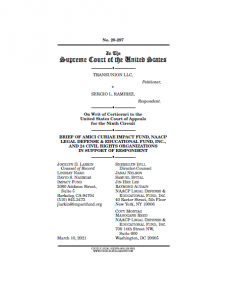Abortion rights, women of color, and LGBTQIA+ people are under attack. Pledge to join us in fighting for gender justice.

 Update: On June 25, 2021, the U.S. Supreme Court ruled 5-4 in favor of TransUnion’s attempt to significantly limit the class of consumers who had standing to sue the company for including inaccurate, damaging information in their credit reports. While it will likely make class-action lawsuits more difficult in the future, the ruling fortunately focuses only on constitutional Article III standing and not typicality under Rule 23(a)(3) of the Federal Rules of Civil Procedure. As the Impact Fund and the NAACP Legal Defense Fund emphasized in their amicus brief that NWLC joined, narrowing Rule 23’s typicality requirement would have been devastating for class actions, and it is heartening that the Court rejected TransUnion’s invitation to do so. Read the Impact Fund’s full statement and analysis of the decision here.
Update: On June 25, 2021, the U.S. Supreme Court ruled 5-4 in favor of TransUnion’s attempt to significantly limit the class of consumers who had standing to sue the company for including inaccurate, damaging information in their credit reports. While it will likely make class-action lawsuits more difficult in the future, the ruling fortunately focuses only on constitutional Article III standing and not typicality under Rule 23(a)(3) of the Federal Rules of Civil Procedure. As the Impact Fund and the NAACP Legal Defense Fund emphasized in their amicus brief that NWLC joined, narrowing Rule 23’s typicality requirement would have been devastating for class actions, and it is heartening that the Court rejected TransUnion’s invitation to do so. Read the Impact Fund’s full statement and analysis of the decision here.
On March 10, 2021, NWLC, along with 23 other organizations, joined an amicus brief submitted by the NAACP Legal Defense and Education Fund, Inc. and the Impact Fund to the U.S. Supreme Court in TransUnion LLC v. Ramirez, a case involving Article III standing for members of certified class actions. The amicus brief focuses on urging the Court to reject TransUnion’s attempt to rewrite the “typicality” requirement of Federal Rule of Civil Procedure 23 in a way that would make it more difficult to bring class actions. Rule 23 requires class representatives to have claims and defenses that are “typical” of the classes they seek to represent, and is a way of ensuring that the interests of the class members are properly accounted for. Making this standard more difficult to meet, as TransUnion seeks to do, would undermine the purpose of Rule 23’s class action mechanism and hurt vulnerable populations that rely on class actions to vindicate important rights.
The amicus brief emphasizes that the plain language of Rule 23, in addition to decades of case law, establish that the typicality requirement does not necessitate that the class representatives suffer identical, or nearly identical, injuries as the class members. All Rule 23’s typicality standard mandates is that the representatives have “claims or defenses” that are typical of the class. Here, Mr. Ramirez and the class members suffered injuries that were caused by the same pattern of conduct by TransUnion and they brought the same claims and defenses to vindicate their rights. Rule 23’s typicality requirement was therefore easily satisfied, the brief argues. TransUnion, however, seeks to increase the burden on Mr. Ramirez beyond what Rule 23 requires by arguing that his injuries must also be the same as the class members. This rewriting of the Rule, the brief contends, would make it much more difficult for class actions to be certified, especially when the class representatives have particularly compelling stories. Because of the harm such a ruling would create, amici ultimately urge the Supreme Court to reject TransUnion’s transparent attempt to evade accountability and unfairly advantage defendants faced with class actions.
